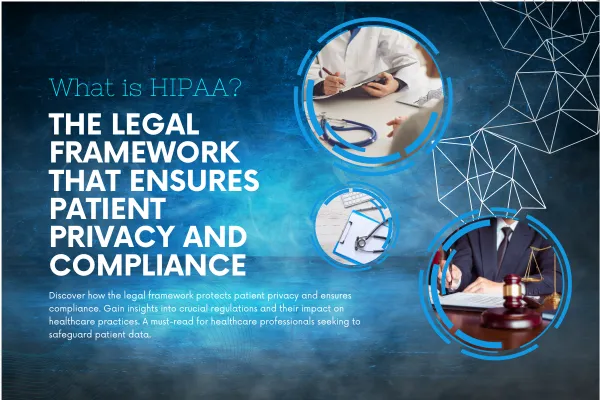Blog
Business IT articles and News

What is HIPAA?: The Legal Framework That Ensures Patient Privacy and Compliance
What is HIPAA?: The Legal Framework That Ensures Patient Privacy and Compliance
Discover how the legal framework protects patient privacy and ensures compliance. Gain insights into crucial regulations and their impact on healthcare practices. A must-read for healthcare professionals seeking to safeguard patient data.
Introduction
In the age of digital information sharing and online transactions, maintaining patient privacy and protecting sensitive medical information has become increasingly challenging. HIPAA (Health Insurance Portability and Accountability Act) Compliance plays a vital role in ensuring that healthcare organizations and providers uphold the legal framework designed to protect patient privacy. The aim of HIPAA Compliance is to safeguard sensitive health information while also providing access to patients and healthcare providers who need it for diagnosis, treatment, or payment purposes. In this blog post, we will explore why HIPAA Compliance is so crucial in today's world, how it protects patient privacy, and what healthcare providers need to do to ensure that they remain compliant with HIPAA regulations.
The Health Insurance Portability and Accountability Act (HIPAA) was enacted in 1996

HIPAA is a federal law that aims to protect the privacy and security of patient health information. The law was enacted in response to the growing concerns regarding the misuse and unauthorized disclosure of patients' health information.
The law consists of two main provisions: the Privacy Rule and the Security Rule. The Privacy Rule sets standards for protecting the privacy of personal health information, while the Security Rule establishes guidelines for ensuring the security of electronic protected health information (ePHI).
Under HIPAA, patients have the right to access their health information, request amendments to their records, and receive an accounting of disclosures of their information. The law also requires covered entities, such as healthcare providers, health plans, and healthcare clearinghouses, to obtain patients' written consent before disclosing their information to third parties.
Overall, HIPAA plays a critical role in protecting patients' privacy and ensuring the confidentiality of their health information. Healthcare organizations that comply with HIPAA can help build trust with patients, while those that fail to comply face significant penalties and reputational damage.
The purpose of HIPAA is to protect the privacy of patient health information
With the ever-increasing amount of personal data available online, patient privacy is a major concern in today's healthcare industry. That's why HIPAA was enacted in 1996 - to ensure that patients' personal and health information is protected and kept confidential. This includes everything from medical records and lab results to insurance claims and billing information.
HIPAA's main objective is to protect patients' sensitive information by setting national standards for healthcare providers, insurance companies, and other entities that handle protected health information (PHI). This means that every entity that handles PHI must ensure that their policies, procedures, and technical measures comply with HIPAA regulations. This includes healthcare providers, insurance companies, pharmacies, and any other organizations that store, process, or transmit PHI.
HIPAA compliance is essential for protecting patients' privacy, but it's also important for organizations themselves. Failing to comply with HIPAA regulations can result in severe penalties, including fines of up to $1.5 million per violation. Organizations that are found to be non-compliant can also suffer damage to their reputation and face legal action from patients whose privacy has been breached.
Overall, the purpose of HIPAA is to create a legal framework that ensures patient privacy and compliance. It provides a standardized set of rules and guidelines for healthcare providers, insurance companies, and other entities that handle PHI. HIPAA compliance is essential for protecting patients' privacy, avoiding legal and financial penalties, and maintaining a good reputation within the healthcare industry.
Schedule Your Free HIPAA Audit Today

HIPAA compliance is required of all organizations that handle protected health information
In order to safeguard the privacy and security of patient health information, HIPAA has established strict guidelines that all healthcare providers, health plans, and healthcare clearinghouses must comply with. This includes any organization that handles protected health information (PHI), whether they are a healthcare provider or a third-party business associate.
HIPAA requires that organizations establish administrative, physical, and technical safeguards to protect PHI from unauthorized access, use, and disclosure. These safeguards include policies and procedures to govern how PHI is collected, used, disclosed, and disposed of, as well as regular training for employees on HIPAA regulations.
The scope of HIPAA compliance is vast and includes many requirements that must be met to ensure compliance. These requirements can range from conducting regular risk assessments, to developing disaster recovery plans, to encrypting all electronic PHI.
Non-compliance with HIPAA can result in severe penalties, including large fines and potential lawsuits. Additionally, organizations may face reputational damage and loss of trust among patients and customers.
In short, HIPAA compliance is not optional – it is a legal requirement for all organizations that handle protected health information. To avoid costly penalties and reputational damage, organizations must take HIPAA compliance seriously and establish a robust compliance program. This program must include ongoing training, monitoring, and updating of policies and procedures to ensure ongoing compliance with HIPAA regulations. It's worth noting that HIPAA compliance is not a one-time event but an ongoing process. Healthcare organizations must regularly assess their compliance with HIPAA regulations and adjust their policies and procedures accordingly. This includes addressing any security incidents promptly and reporting any breaches to the Department of Health and Human Services' Office for Civil Rights.
Furthermore, healthcare providers must also ensure that their third-party vendors and business associates are HIPAA compliant. This includes anyone who handles PHI, such as billing companies, transcription services, and IT support companies. All third-party vendors must sign a business associate agreement (BAA), outlining their responsibilities and obligations under HIPAA.
Overall, HIPAA compliance is critical for maintaining patient privacy and security in the digital age. It ensures that patient information is protected from unauthorized access, use, and disclosure, which is especially important as technology continues to advance. By establishing a robust HIPAA compliance program, healthcare organizations can protect their patients' privacy and avoid costly penalties.
There are severe penalties for non-compliance with HIPAA
HIPAA violations can result in serious consequences for organizations that handle protected health information (PHI). Depending on the severity of the breach, penalties can range from civil fines to criminal charges and imprisonment. In 2020, the Department of Health and Human Services (HHS) announced that a total of $13.7 million was collected from organizations that violated HIPAA regulations.
The fines for non-compliance with HIPAA are structured based on the level of neglect involved in the breach. The penalty ranges are:
Tier 1: Reasonable cause, a penalty of $100 to $50,000 per violation
Tier 2: Willful neglect corrected within a certain time frame, a penalty of $1,000 to $50,000 per violation
Tier 3: Willful neglect not corrected within a certain time frame, a penalty of $10,000 to $50,000 per violation
Organizations that fail to implement HIPAA compliance can face long-term consequences beyond the initial fine. Data breaches can damage a company's reputation and lead to a loss of customers. The legal fees associated with a HIPAA violation can also be significant, particularly if an organization needs to fight a lawsuit in court.
It's essential for organizations that handle PHI to prioritize HIPAA compliance to avoid the severe penalties associated with non-compliance. Organizations should regularly assess their policies, procedures, and technologies to ensure they meet the standards set by HIPAA regulations. Staying vigilant and proactively addressing any gaps in HIPAA compliance can help avoid the serious consequences that come with HIPAA violations.

HIPAA compliance is an ongoing process
HIPAA compliance isn't a one-and-done deal. It's not just a matter of implementing some policies and procedures and calling it a day. Maintaining HIPAA compliance is an ongoing process that requires regular review and update of policies, procedures, and training. This is because the healthcare industry is always evolving, and with new technologies, comes new challenges to maintaining the privacy and security of protected health information.
It's essential to perform regular risk assessments to identify potential vulnerabilities and address them before they can be exploited. This includes ensuring that all software and hardware are up to date and secure, and that all employees are trained and educated on HIPAA compliance best practices. This will help to minimize the risk of a data breach, which could lead to significant financial and legal consequences.
HIPAA compliance also requires that covered entities (such as hospitals, insurance providers, and healthcare professionals) maintain appropriate documentation, including policies and procedures, training logs, and incident response plans. This documentation is critical in demonstrating compliance in the event of an audit or investigation.
In addition, organizations must have procedures in place to respond to and report data breaches in a timely and appropriate manner. HIPAA requires that any breach affecting 500 or more individuals must be reported to the Department of Health and Human Services (HHS) within 60 days.
Nerd Nation IT specializes in providing IT and Network services for industries that face the overwhelming burden of HIPAA compliance. For any questions about our services or HIPAA compliance for your network, give us a call at 307-296-1906.
Schedule Your Free HIPAA Audit Today




